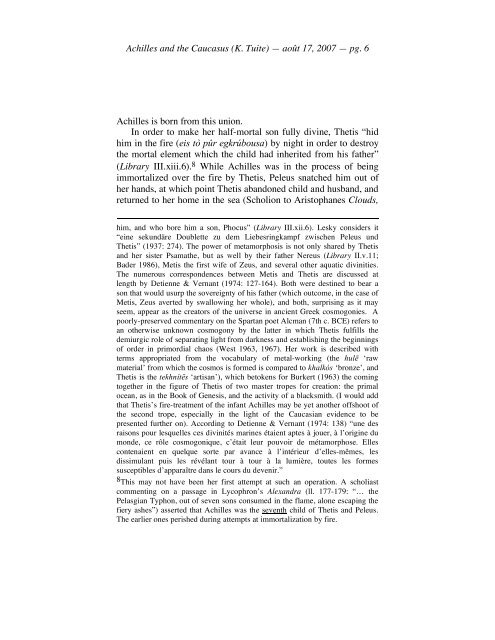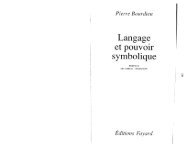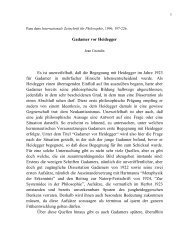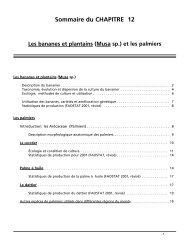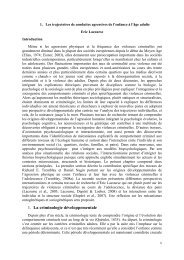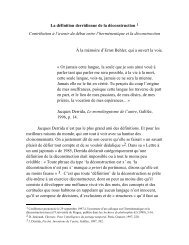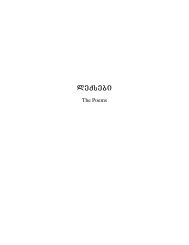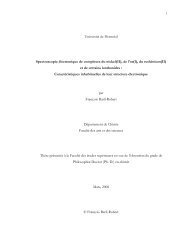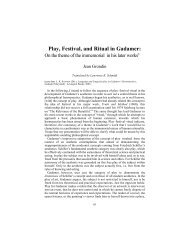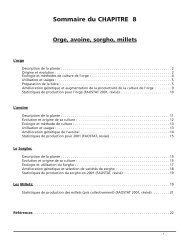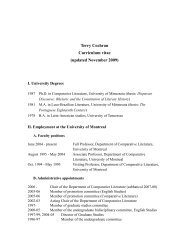Achilles and the Caucasus - Université de Montréal
Achilles and the Caucasus - Université de Montréal
Achilles and the Caucasus - Université de Montréal
Create successful ePaper yourself
Turn your PDF publications into a flip-book with our unique Google optimized e-Paper software.
<strong>Achilles</strong> <strong>and</strong> <strong>the</strong> <strong>Caucasus</strong> (K. Tuite) — août 17, 2007 — pg. 6<br />
<strong>Achilles</strong> is born from this union.<br />
In or<strong>de</strong>r to make her half-mortal son fully divine, Thetis “hid<br />
him in <strong>the</strong> fire (eis tò pûr egkrúbousa) by night in or<strong>de</strong>r to <strong>de</strong>stroy<br />
<strong>the</strong> mortal element which <strong>the</strong> child had inherited from his fa<strong>the</strong>r”<br />
(Library III.xiii.6). 8 While <strong>Achilles</strong> was in <strong>the</strong> process of being<br />
immortalized over <strong>the</strong> fire by Thetis, Peleus snatched him out of<br />
her h<strong>and</strong>s, at which point Thetis ab<strong>and</strong>oned child <strong>and</strong> husb<strong>and</strong>, <strong>and</strong><br />
returned to her home in <strong>the</strong> sea (Scholion to Aristophanes Clouds,<br />
him, <strong>and</strong> who bore him a son, Phocus” (Library III.xii.6). Lesky consi<strong>de</strong>rs it<br />
“eine sekundäre Doublette zu <strong>de</strong>m Liebesringkampf zwischen Peleus und<br />
Thetis” (1937: 274). The power of metamorphosis is not only shared by Thetis<br />
<strong>and</strong> her sister Psama<strong>the</strong>, but as well by <strong>the</strong>ir fa<strong>the</strong>r Nereus (Library II.v.11;<br />
Ba<strong>de</strong>r 1986), Metis <strong>the</strong> first wife of Zeus, <strong>and</strong> several o<strong>the</strong>r aquatic divinities.<br />
The numerous correspon<strong>de</strong>nces between Metis <strong>and</strong> Thetis are discussed at<br />
length by Detienne & Vernant (1974: 127-164). Both were <strong>de</strong>stined to bear a<br />
son that would usurp <strong>the</strong> sovereignty of his fa<strong>the</strong>r (which outcome, in <strong>the</strong> case of<br />
Metis, Zeus averted by swallowing her whole), <strong>and</strong> both, surprising as it may<br />
seem, appear as <strong>the</strong> creators of <strong>the</strong> universe in ancient Greek cosmogonies. A<br />
poorly-preserved commentary on <strong>the</strong> Spartan poet Alcman (7th c. BCE) refers to<br />
an o<strong>the</strong>rwise unknown cosmogony by <strong>the</strong> latter in which Thetis fulfills <strong>the</strong><br />
<strong>de</strong>miurgic role of separating light from darkness <strong>and</strong> establishing <strong>the</strong> beginnings<br />
of or<strong>de</strong>r in primordial chaos (West 1963, 1967). Her work is <strong>de</strong>scribed with<br />
terms appropriated from <strong>the</strong> vocabulary of metal-working (<strong>the</strong> hulē ‘raw<br />
material’ from which <strong>the</strong> cosmos is formed is compared to khalkós ‘bronze’, <strong>and</strong><br />
Thetis is <strong>the</strong> tekhnítēs ‘artisan’), which betokens for Burkert (1963) <strong>the</strong> coming<br />
toge<strong>the</strong>r in <strong>the</strong> figure of Thetis of two master tropes for creation: <strong>the</strong> primal<br />
ocean, as in <strong>the</strong> Book of Genesis, <strong>and</strong> <strong>the</strong> activity of a blacksmith. (I would add<br />
that Thetis’s fire-treatment of <strong>the</strong> infant <strong>Achilles</strong> may be yet ano<strong>the</strong>r offshoot of<br />
<strong>the</strong> second trope, especially in <strong>the</strong> light of <strong>the</strong> Caucasian evi<strong>de</strong>nce to be<br />
presented fur<strong>the</strong>r on). According to Detienne & Vernant (1974: 138) “une <strong>de</strong>s<br />
raisons pour lesquelles ces divinités marines étaient aptes à jouer, à l’origine du<br />
mon<strong>de</strong>, ce rôle cosmogonique, c’était leur pouvoir <strong>de</strong> métamorphose. Elles<br />
contenaient en quelque sorte par avance à l’intérieur d’elles-mêmes, les<br />
dissimulant puis les révélant tour à tour à la lumière, toutes les formes<br />
susceptibles d’apparaître dans le cours du <strong>de</strong>venir.”<br />
8 This may not have been her first attempt at such an operation. A scholiast<br />
commenting on a passage in Lycophron’s Alex<strong>and</strong>ra (ll. 177-179: “… <strong>the</strong><br />
Pelasgian Typhon, out of seven sons consumed in <strong>the</strong> flame, alone escaping <strong>the</strong><br />
fiery ashes”) asserted that <strong>Achilles</strong> was <strong>the</strong> seventh child of Thetis <strong>and</strong> Peleus.<br />
The earlier ones perished during attempts at immortalization by fire.


